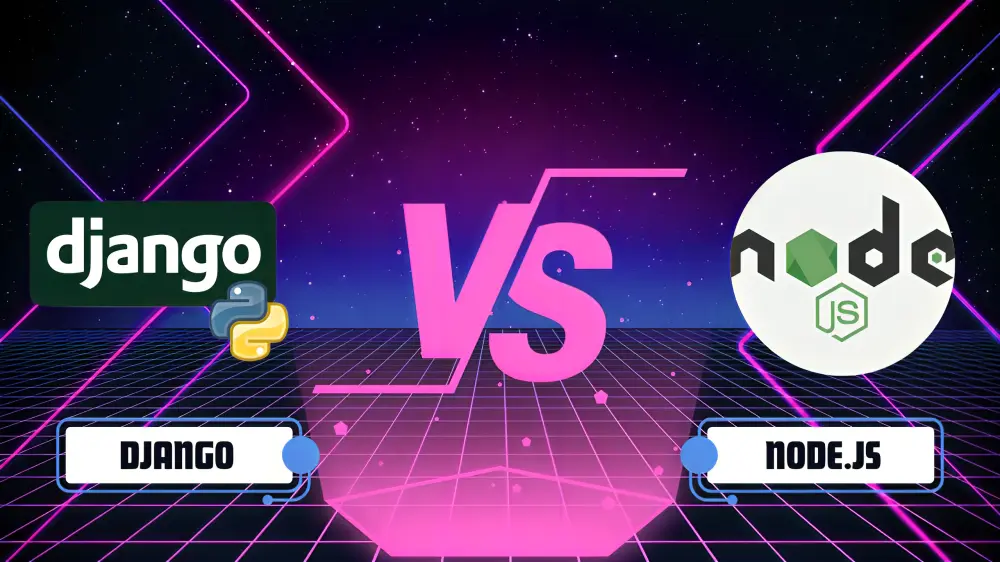In web development, the framework you choose can have a significant impact on the success of your project. Django vs Node.js are two popular choices among developers. Each has advantages and disadvantages, depending on the project requirements and the developers’ preferences. To help you make an informed decision, let’s compare Django and Node.js.
Django vs Node.js Overview
| Basis | Django | Node.js |
| Architecture | MVT | Event-driven |
| Security | More secure (provides in-built security mechanism) | Less secure |
| Development time | Less time | More time |
| Complexity | More complex | Less complex |
| Scalability | Can handle huge traffic and a large amount of data | Can handle a large number of requests simultaneously |
| Performance | Slower | Faster |
| Cost efficiency | More cost efficient | Less cost efficient |
| Community | Relatively smaller and less active | Large and more active |
What is Node.js?
Node.js provides a JavaScript runtime environment that supplies every element required for a piece of code to run or execute. This environment consists of memory, libraries, environment variables, and resources like sockets and files. Node.js also ensures that the allocated memory is used up and that the program is properly started.
What is Django?
Django is a Python framework designed for backend web development. A framework is a kind of template that lets us make apps fast and simply without requiring us to do all of the setup work by hand. This frees us up to focus more on feature development rather than setup. Examples of functions that a framework can perform include handling hardware, processing input, interacting with system software (like the operating system), and more.
Performance and Scalability
Django’s
- Robust Data Handling: Perfect for applications requiring extensive database management and interaction.
- High Traffic Management: demonstrated ability to smoothly handle large volumes of users.
- Security and Reliability: is a reliable option for managing sensitive user data because it provides robust security features.
Node.js’s
- Real-Time Data Processing: Because of its exceptional real-time data management capabilities, this technology is ideal for chat apps and real-time updates.
- Managing Concurrent Connections: efficiently manages multiple concurrent user interactions.
- Scalability: the capacity to continue operating with performance and responsiveness as user and data volumes increase.
Developer Experience and Learning Curve
Django
- Ease of Use: Django’s well-organized methodology and lucid documentation render the learning process relatively easy for novices.
- Complete Package: Because of the “batteries-included” philosophy, which reduces the need for third-party plugin integration, developers can use the majority of tools immediately.
- Community Support: a large and friendly community with a wealth of third-party packages, guides, and forums.
- Learning Resources: Online courses, community tutorials, and official documentation are just a few of the many available resources.
- Perfect for: inexperienced web developers or those seeking a more organized, pre-configured solution.
Node.js
- Knowledge of JavaScript: For those who are already familiar with JavaScript, Node.js is a natural next step because it allows you to use one language for both front-end and back-end development. The event-driven, non-blocking input/output paradigm that asynchronous programming offers can be challenging for beginners to grasp but has performance benefits.
- Large-scale NPM Registry: a huge selection of packages that meet almost every need and are listed in the npm registry.
- Society and Assets: a vibrant community with an abundance of resources, including online tutorials, developer forums, and thorough documentation.
- Perfect for: developers who are familiar with JavaScript and asynchronous programming, particularly those who want to create data-intensive real-time applications.
Job Market and Industry Demand
Django: Steady Demand in Certain Sectors
- Preferred in Certain Industries: Since its stability and security features are highly valued in industries like journalism, e-commerce, and education, Django is frequently chosen.
- Python’s Rising Popularity: Python’s rise in machine learning and data science has opened doors for Django developers working in data-driven fields.
- Stable Demand: Demand for Django developers is steady, particularly from businesses that appreciate the framework’s dependability and scalability for expansive applications.
Node.js: High Demand in Modern Web Development
- Preferred for Real-Time Applications: Businesses that specialize in real-time applications, like chat services, streaming platforms, and SPAs, frequently look for Node.js knowledge.
- Growing in Startups and Tech Companies: Because of Node.js’s scalability and efficiency, many startups and tech companies prefer it, especially when creating contemporary web and mobile applications.
- Versatility Attracts Opportunities: Given the versatility and wide range of applications of the framework, Node.js developers might find more opportunities.
Top Differences Between Django vs Node.js
- Architecture
When a request is made for a specific URL, the view works with the model to retrieve data from the database. The user can view the template in their browser once the request has determined which template needs to be rendered. Therefore, since a monolithic application consists of all the components and services tightly integrated into one large codebase, Django is appropriate for architecture-based projects that are monolithic.
Node.js architecture is event-driven. Anything that occurs is an event. It could be a swipe, scroll, hover, or button click. Applications that are event-driven react when specific events occur. Because it is event-driven, microservices can be implemented with it. Microservices comprise independent, loosely connected services that collectively constitute an application. Thus, one or more microservices would be in charge of managing or reacting to an event when it is triggered.
- Development Time
Django offers several tools to assist in reducing the amount of code. Because of its “batteries-included” mentality, developers can create a fully functional application more rapidly and avoid writing a lot of boilerplate code. For node.js, there are many npm packages available, but we shouldn’t rely just on them because some might not be well-maintained, optimized, or follow best practices. Overall, Django thus triumphs in this situation.
- Complexity: Django requires developers to follow a specific path to accomplish tasks, whereas node.js allows for greater flexibility. Consequently, node.js is simple to learn.
- Cost efficiency: Node.js is considered less economical than Django because applications are developed more slowly by Node.js, resulting in increased time and cost.
- Community: Django has a sizable community, but not as large as that of node.js. Node.js is more widely used and has a thriving community.
FAQ of Django vs Node.js
Q1. Is Django better than Node.js?
Ans. Node. js is better for building scalable apps that can handle multiple requests, especially because scalable apps require more flexibility in designing various app features. Django also supports handling multiple high-traffic requests and applications.
Q2. Which is more popular: NodeJS or Django?
Ans. Node.js is often used for real-time applications and APIs, whereas Django is best suited for rapid development and data-driven applications.
Q3. In three months, should I learn Django or NodeJS for a job?
Ans. There are jobs available in both Node.js and Django, but which one you choose will depend on your professional objectives and the kinds of projects you want to work on.





